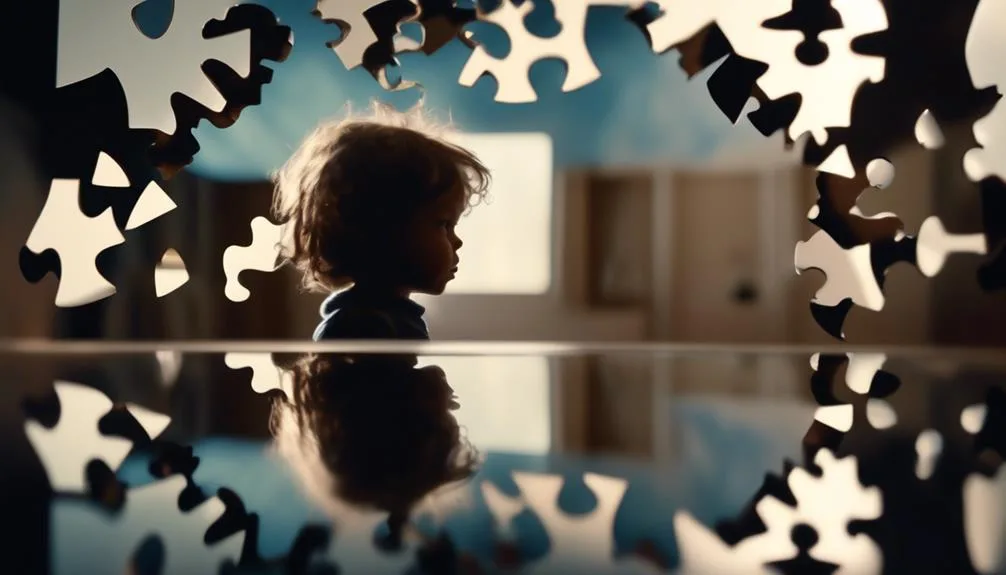Congratulations, you've just won a lifetime subscription to uncertainty and self-doubt, all thanks to your weak sense of self!
But seriously, you might not realize how this inner void can wreak havoc on every decision and relationship you encounter. Your sense of self is the invisible backbone of your personality, and when it's not robust, you're likely to bend to the slightest pressure.
You've probably noticed moments when your opinions seem to echo those around you, or when your goals mysteriously align with someone else's expectations. It's no coincidence; it's a sign that your personal compass isn't pointing true north.
As you continue, you'll uncover the subtle yet pervasive ways a weak sense of self can distort your life's trajectory. What's more, you'll discover that the journey to a stronger self-identity is not just a path to personal fulfillment—it's a necessity for living a life that's authentically yours.
Key Takeaways
- A strong sense of self is essential for differentiation and personal growth.
- Poorly developed sense of self can lead to mental health issues.
- Weak sense of self can be caused by religious or societal expectations.
- Developing a strong sense of self is essential for living a fulfilled life.
Sense of Self Explained

Understanding your sense of self is like peering into the core of your being, where the essence of who you are—your beliefs, values, and personality—resides and shapes your interaction with the world around you. It's a foundational element that anchors you amidst life's chaos.
Developing self-awareness is akin to mapping this inner territory; it's a scholarly quest to know and accept your unique composition. By nurturing self-expression, you give voice to your individuality, allowing it to blossom.
This isn't just about introspection; it's a dynamic process of growth and understanding. You're not only discovering your place in the tapestry of humanity but also contributing to its rich and intricate design.
Recognizing Developmental Signs

Recognizing the signs of a poorly developed sense of self can be the first step towards personal transformation, as it allows you to identify areas in need of growth and understanding. By recognizing early signs, you're equipped to start building self-confidence and nurturing a robust identity.
Here's a concise table to help identify key developmental signs:
| Age Range | Signs of Weak Sense of Self | Potential Interventions |
|---|---|---|
| Childhood | Hesitation in expressing preferences | Encourage choice-making |
| Adolescence | Over-reliance on peer approval | Foster critical thinking |
| Early Adulthood | Difficulty setting personal goals | Support goal-setting skills |
| Adulthood | Persistent self-doubt | Provide resources for self-exploration |
Analytically, each developmental stage has unique indicators and opportunities for growth. Empathetically, understanding these signs is critical for nurturing self-awareness and self-acceptance in oneself or others.
Consequences of Weak Identity

When individuals possess a weak sense of self, they often experience a range of adverse consequences that can permeate every aspect of their lives, from personal relationships to career aspirations. The impact on relationships is profound; these individuals may struggle with forming genuine connections, often conforming to others' expectations at the cost of their own identity. They're frequently ensnared in co-dependent dynamics, lacking the emotional resilience to assert their needs and desires.
Furthermore, the spiritual implications of a weak identity are significant. Such individuals might gravitate towards dogmatic beliefs or charismatic leaders, seeking an external anchor for a sense of purpose. This can lead to spiritual abuse and a further erosion of self, as personal beliefs and values are subsumed by the collective.
Pathways to Self-Discovery

Embarking on the journey of self-discovery, you'll find that delving into the depths of your personal identity can unlock the door to a more authentic and fulfilling life.
A key element in this pursuit is finding your purpose, a compass that guides your decisions and actions. You might feel overwhelmed at first, but there are practical steps you can take. Journaling techniques, for instance, offer a reflective space to explore your thoughts and aspirations.
Through systematic and thoughtful inquiry within your journal's pages, patterns emerge, revealing your core values and passions. This isn't just an exercise; it's a scholarly method to excavate the nuanced facets of your being.
Such practices lay the groundwork for a robust sense of self, essential for navigating life's complexities with resilience and grace.
Embracing Personal Responsibility

As you uncover the layers of your identity through reflective journaling, you'll also encounter the pivotal role personal responsibility plays in forging your path to a stronger sense of self. Recognizing this is crucial for your personal growth. You learn that setting boundaries is not about pushing others away, but about honoring your values and space.
Here's a framework to consider:
| Personal Growth | Setting Boundaries | Responsibility |
|---|---|---|
| Self-awareness | Clear limits | Accountability |
| Continuous learning | Respect for self & others | Choice-making |
| Adaptability | Communication skills | Self-reliance |
| Openness to change | Consistency | Ownership of actions |
Embrace this responsibility with empathy for your journey and a scholarly commitment to understanding yourself. By doing so, you create a robust foundation for your identity.
Frequently Asked Questions
How Does a Weak Sense of Self Influence One's Career Choices and Professional Development?
You might experience career stagnation and job dissatisfaction if you have a weak sense of self, as it can hinder assertive decision-making and confidence in pursuing professional growth opportunities.
Can a Weak Sense of Self Affect Physical Health, and if So, How?
You might not realize it, but a weak sense of self could be undermining your physical health, heightening stress responses, and dampening immune function, potentially leading to a cascade of health issues.
What Role Do Cultural Factors Play in the Development of a Weak Sense of Self?
Cultural identity and societal expectations shape you profoundly. They can undermine your confidence if they don't align with your personal values, potentially leading to a weakened sense of self.
How Does a Weak Sense of Self Impact Parenting Styles and the Sense of Self in Children?
Your parenting approach can shatter or shape your child's resilience. A weak sense of self may echo through parenting dynamics, risking the development of a similarly fragile identity in your children.
Are There Any Notable Differences in How a Weak Sense of Self Manifests in Various Age Groups, Such as Adolescents Versus Adults?
You'll find adolescents often face identity crises due to peer influence, while adults may struggle with a weak sense of self in their professional or personal lives, impacting long-term goals and relationships.
Conclusion
So, you've been a chameleon, blending into life's backdrop, huh? Adorable, but let's face it, your unique hue's been as clear as mud. Congrats on chasing others' dreams—hope they're fun!
Now, how about a plot twist? Find that compass called 'self,' and maybe, just maybe, you'll stop being life's guest star and finally nab the lead role. Embrace the quest within; it's time to turn those 'missing pieces' into a masterpiece.

